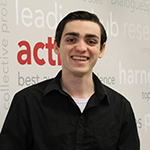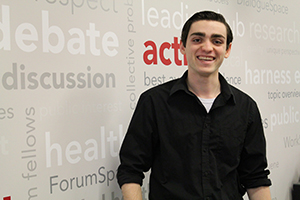
Canadian scholar Michael Parvizian, 21, has spent three months developing his knowledge of health systems during an internship at the Sax Institute, after being awarded a Queen Elizabeth Scholarship in Strengthening Health Systems by the McMaster Health Forum in Ontario, Canada. In this Q&A, he reflects on some of the insights he’s gained during his time here.

Q: What attracted you to spending your internship at the Sax Institute?
A: Two former scholarship winners who undertook internships at the Sax Institute last year, Chris Gallano and Alex Kilian, talked about the great experiences they had, and it convinced me I would really benefit by spending time here. Learning how to look at and evaluate health issues from a systems perspective is important, and something Sax does very well.
Q: What projects have you been working on in your time here?
A: I have been working with Dr Anna Williamson, Director of CIPHER (Centre for Informing Policy in Health with Evidence from Research) and undertaking a review of the literature about the social and emotional wellbeing of Australian children at the point they are entering school. This is a point in time that is very predictive of what will happen to children in later life, so it is very important. The work will help inform a study Dr Williamson is undertaking on the mental health trajectories of urban Aboriginal children. I have also been working with the SEARCH (Study of Environment on Aboriginal Resilience and Child Health) team on a qualitative research project that involved interviews with healthcare providers at Aboriginal Community Controlled Health Services regarding the mental health trajectories of children and adolescents. I’ve been coding and analysing the transcripts. It’s really interesting because the project will help inform us as to what’s working and what’s not, and what resources might be needed in the future. I’m really interested in the approach taken by SEARCH, which is a partnership between the Sax Institute, researchers, Aboriginal Community Controlled Health Services and the Aboriginal Health & Medical Research Council, because the partnership model means the community has true buy-in to the research, and is able to use it to come up with real solutions.
Q: What have you learnt during your time here?
A: I’ve learnt some practical research skills, but I think the most valuable thing I’ve got out of my time here is the approach to looking at the big challenges in healthcare, which are far more complex than simply saying: “You have a disease, here’s a pill you can take”. Health issues like obesity or mental health are not easy fixes. They are multifaceted and complex problems and we need to look at them from a macro level, looking at systems approaches and bundled interventions. Whether I become a physician in the ED, or a psychiatrist, or a family doctor, I will be just one part of a much bigger solution to treating these complex health issues.
Q: Do you think those insights will be applicable in Canada, or elsewhere?
A: Australia and Canada both have very diverse populations, and their First Nations populations face significant health and social challenges, so I think partnership research like that being done here will become an increasingly important way of developing solutions together with communities. I think understanding different perspectives is going to be important, no matter what you do or where you go, which is why exchanges like this are so important.
Q: What is next in your career?
A: I have just graduated from the Bachelor of Health Sciences degree at McMaster University and have been accepted into medical school, so I’ll be returning to Canada shortly to embark on my medical degree.
The Queen Elizabeth Scholarships in Strengthening Health Systems aim to develop the community of young global leaders and create lasting impacts on health systems throughout the Commonwealth.
Find out more
- Watch the video interviews of former Queen Elizabeth Scholarship winners Alex Kilian and Chris Gallano
- Sign up to receive updates on our news and events
